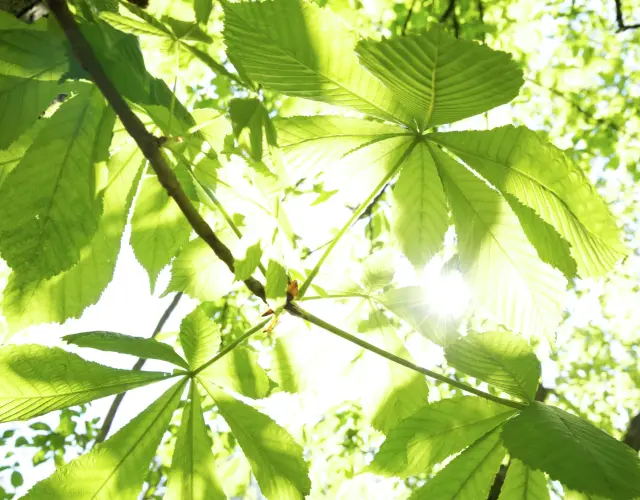
Let's go low CO2 emissions and resource efficiency
- Back
- Home
- Responsibility
- The environment and value creation
We only have one planet to live on and we must preserve it for future generations. That is why we are committed to the responsible use of energy and resources. This includes protecting the water, the air and the soil. To enable us to make an important contribution in this area, we are constantly working to cut our CO 2 emissions.
Our aim is to reduce and not to offset! We are innovating and investing to bring about a significant reduction in our CO 2 footprint . This applies both to our corporate carbon footprint (CCF) and our product carbon footprint (PCF),
which is why we put the emphasis on the quality and longevity of our products. The longer our customers can use our products for, the more sustainable those products are. But for us, putting sustainability into practice goes much further than that. For years, we have been working to expand our comprehensive range of services and to improve our environmental management and efficiency.
We guarantee high social standards in our supply chains and use high-grade raw materials from certified suppliers.
It goes without saying that we don't have the perfect solution for every problem – but we're working on it!

The environment
The WAREMA Group's activities are characterised by the responsible consumption of resources and energy. Our goal is to reduce our CO 2 emissions as much as possible.
Our products have not travelled across the world by the time they reach our customers.
We manufacture our products in Germany and in other European countries.
This enables us to shorten our transport routes, reduce our resource use and fulfil our social responsibilities.
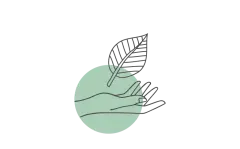
Value creation
WAREMA stands for quality . This is the starting point for our sustainability initiatives and the guiding principle behind them. The longer a product is used for, the more sustainable it is, as this allows valuable resources to be saved and waste to be avoided.
In addition, we use high-grade raw materials from certified suppliers and guarantee high social standards in our supply chains.
Climate protection and the energy transition
Two key factors in the reduction of CO 2 emissions are energy efficiency and the increasing use of renewable energies . But it is also clear that unless all of our employees have the right mindset, we cannot achieve our targets. This is why we have created a culture where everyone is involved. It is only possible to achieve lasting results when everyone is working towards the same goals.
The subject of energy efficiency is particularly important in relation to our buildings. As part of a renovation project in 2021, we replaced all our existing lights with energy-saving LED lighting . The WAREMA Group has invested around €150,000 in this measure and the investment is already paying off. The new technology is reducing our energy consumption by around 630,000 kWh per year . That corresponds to about 228 tonnes of CO 2 .
As experts in sun shading systems, we know how much energy the sun can produce. For this reason, we have installed photovoltaic systems at our sites in Marktheidenfeld, Wertheim-Bettingen and Limbach-Oberfrohna.
In 2023, we brought three new photovoltaic systems into operation on the roofs of our production sites. These are at WAREMA Kunststofftechnik und Maschinenbau GmbH in Marktheidenfeld, at WAREMA Renkhoff SE in Marktheidenfeld and at WAREMA Sonnenschutztechnik in Limbach-Oberfrohna. These, together with the existing photovoltaic system at our production and logistics site in Wertheim-Bettingen, will enable us to produce around 2.8 GWh of clean electricity per year in future. This means a reduction of around 750 tonnes of CO 2 when compared with electricity from the grid with the current emission factor (2023).
The majority of the electricity that we produce will be used on site and any surplus energy will be fed into the grid. We are also planning another photovoltaic system at our site in Pécs in Hungary which will produce around 175 MWh per year and will help to meet the energy requirements of the powder coating unit there.
The annual saving achieved by these three photovoltaic systems amounts to an impressive 400 tonnes of CO 2 .
The commitment of our employees has enabled us to reduce electricity consumption by 15% in three months at our largest production site, for example. We are continuing to introduce a variety of communication measures and campaigns so that we can make progress in this area and also reduce our paper and energy consumption. We are also providing support for employee transport. At our Marktheidenfeld site, we belong to the PENDLA online carpooling platform. We also have a cycle leasing scheme.
One example of this is the wood-chip heating system at the Dillberg site in Marktheidenfeld, which primarily heats the offices there, but also other WAREMA buildings on the site. The recycling of waste wood, for example around 220 tonnes of disposable wooden pallets, saves around 80,000 litres of heating oil per season.
Our employees are passionate about innovation and sustainability. We are proud of the ideas that they come up with! In 2022 , WAREMA took part in the IHK-Energiescouts project for the third time. Four young apprentices began thinking of ways for WAREMA to become even more sustainable and launched their own digital springclean project.
The WAREMA team took first place among the ten companies taking part. The judges were impressed by the team's innovative, end-to-end approach. This not only identified obvious potential savings by removing superfluous servers , but also focused on involving the employees by running workshops, providing buttons for monitors and creating short videos.
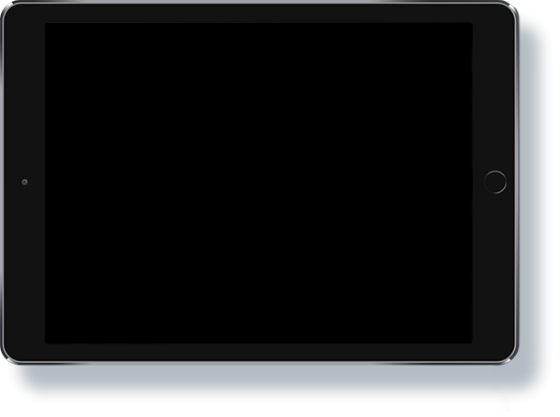
Wood-chip heating
In addition to the photovoltaic systems at an increasing number of locations and the combined heat and power plants at WAREMA Kunststofftechnik und Maschinenbau GmbH and at the WAREMA logistics and production site in Wertheim, we also operate a wood-chip heating system in Marktheidenfeld where we use our own waste wood.
Responsible resource management
Sometimes you have to take a circular approach to reach your destination. Of course, this applies in particular to the use of raw materials.
The subject of the circular economy is a key part of responsible resource management . But when it comes to the efficient use of materials, we are not going around in a circle. We encourage our employees to make careful use of resources. In addition to choosing the right materials and using them efficiently, WAREMA also takes responsibility for the materials that are left over. Making further use of these and regarding them as a valuable raw materials and not as waste is a genuinely circular approach.
The majority of our waste is already sorted for recycling, reused or, best of all, avoided in the first place. By 2030 , we aim to reduce by at least 25% the amount of "mixed waste" we produce which cannot be sorted for recycling or reused. Our investment in baling presses allows us to compress cardboard waste on site . This significantly reduces the amount of transport we need and cuts our CO 2 emissions in this area by 90% compared with our previous process .
In addition to cutting CO
2
emissions, waste and transport, we would also like to reduce our packaging.
In our logistics department, we are currently trying out an exciting solution. Until now we have packed screws, nails and other small fixing materials in bags made from new plastic. We use more than one million of these each year. Our aim is to replace this packaging with bags made from 65% recycled plastic.
There is still a lot to do, but we are coming to grips with it!
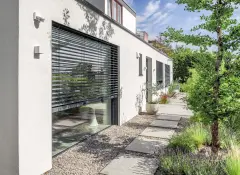
Sun shading solutions from WAREMA – for a better climate
Sun shading systems lie at the heart of our business. They create a pleasant, comfortable climate inside your home. But they also bring benefits for the climate outside your front door and for your bank account, because of the savings you can make on your energy bills and the subsidies that are available. Whether you are building a new home or renovating an existing one, intelligent sun shading solutions such as awnings, roller shutters and external venetian blinds ensure that your house stays cool inside, protect you from glare, UV rays and nosy neighbours and improve the energy efficiency of your home. The quality and longevity of our products are particularly important considerations for us. This is reinforced by the services we provide, such as the 5-year manufacturer's warranty and the 10-year protection package for outdoor living products.
This is our contribution to sustainability, to climate protection and to the responsible use of resources. Would you like to find out more about how you can help the environment and the climate with sun shading systems?
Corporate carbon footprint (CCF)
What is a corporate carbon footprint (CCF)?
The starting point of our climate strategy is the company's own CO 2 emissions, the corporate carbon footprint (CCF) . This was calculated for WAREMA for the baseline year 2021 according to the international Greenhouse Gas Protocol (GHG) . This involved calculating all the greenhouse gas emissions from the company's entire value creation process. The result: To meet its challenging targets, WAREMA must reduce its scope 1 and 2 greenhouse gas emissions by 42% by 2030. In the case of scope 3 emissions, a reduction of 25% is needed (in comparison to the baseline year 2021).
What does that mean in figures for WAREMA?
For the
baseline year 2021
, a
corporate carbon footprint of around 260,000 tonnes of CO
2
e
was calculated with the help of the external climate experts at the B.A.U.M. Group. As a result of the many measures we have already taken, we have seen a massive reduction in this figure to 233,000 tonnes in the 2022 financial year.
We achieved even more savings in the 2023 financial year and reduced the figure to 190,000 tonnes of CO
2
e.
The Science Based Targets Initiative (SBTi)
By becoming involved in the Science Based Targets Initiative, WAREMA undertook to set its own climate targets and, in accordance with the Paris Climate Agreement, to help keep the global rise in temperatures to below 1.5°C.
What is the Science Based Targets Initiative?
The Science Based Targets Initiative provides guidelines for the scientific calculations needed for decarbonisation. The aim is for companies to take responsibility for their own CO2 emissions and to reduce them before they are produced, instead of offsetting them later.
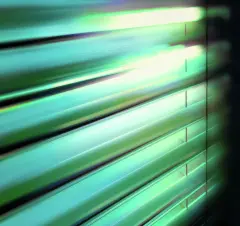
Future materials
We are on the right track
We have a clear goal. We want to reduce CO 2 emissions from our products by a further 30% by 2030.
That's why we do the research: we have calculated the CO
2
footprints of our most popular products. The calculations have already produced positive results, because an external sun shading system in its usage phase can save up to 28 times more CO
2
than it generates during its entire life cycle, including the extraction of raw materials, production, logistics, usage and disposal.
But that's not enough for us: using this information, we have set ourselves the clear goal of reducing the CO
2
emissions of our products by a further 30% by 2030. Aluminium is one of our most important raw materials. We are already focusing on a combination of CO
2
reduction and longevity. We therefore continuously review the raw materials we use and try to exploit existing potential. As a first step, we have already successfully achieved savings with CO
2
-reduced aluminum.
Certified quality
A key requirement for WAREMA is ensuring and continuously improving the high quality standards of our products, services, occupational safety and environmental protection by means of a comprehensive management concept.
By doing this, we can ensure that the world-renowned reliability, safety and durability of our sun shading systems, as well as their impact on the efficiency of residential and office buildings, will be guaranteed now and well into the future.
Sustainability report
WAREMA has set itself major targets with its own sustainability strategy 2030. These include accepting responsibility, achieving the highest possible level of transparency and honestly reducing its own emissions.
Our first sustainability report explains the details and the individual steps. The report clearly indicates our plans in this area and our existing achievements.

The best form of value creation
Leftover pieces of material can be reused. And it is important to emphasise the social effect. BRICHBAGs are produced by MANOMANA in Augsburg, the first social enterprise in the regional textile industry. What is special about
MANOMAMA
is that Sina Trinkwalder, the managing director, has created jobs for many people who would otherwise have had difficulty finding work.
Each BRICHBAG purchased also pays for a rucksack for a homeless person, filled with all sorts of useful items for people who are forced to live on the streets.
This can make the lives of people who are having a tough time just a little bit easier!




